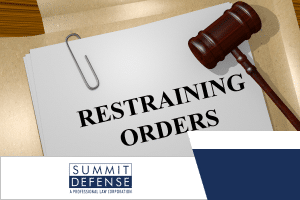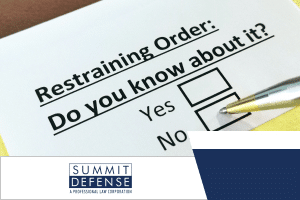 Violating a restraining order is a severe criminal offense in California. The punishment laid for this violation involves years of imprisonment and thousands of penalty fines.
Violating a restraining order is a severe criminal offense in California. The punishment laid for this violation involves years of imprisonment and thousands of penalty fines.
Furthermore, a violating defendant may also lose their gun possession rights, child custody rights, and spousal rights. In addition, the defendant in question may also lose rights over some of their properties.
Even if the protected person gave the defendant permission to visit, the law may still not recognize this as a legitimate basis for crossing a restraining order. This is because the court would demand physical proof of the victim's approval.
If you have been accused of breaking an active restraining order, it is essential to seek legal assistance immediately.
This blog post will discuss what happens if you violate your own restraining order in California. We will cover the punishments, definitions, and laws related to restraining orders.
What Is A Restraining Order?
 A restraining order is also defined as a protective order. This legal order prevents the person under the restraining order from contacting or approaching the issuing person.
A restraining order is also defined as a protective order. This legal order prevents the person under the restraining order from contacting or approaching the issuing person.
Abuse victims mostly use this legal order to protect themselves from their abusers. A victim can demand a temporary or permanent, depending on several factors.
The person issuing the order is called the protected person, while the other party is the restrained person.
A temporary restraining order can last for five years in most cases. However, the duration of a temporary restraining order (TRO) varies depending on the court's decision.
The protected person can demand to increase a TRO to a permanent restraining order. The protected person's party will need to provide documentation and proof to justify why they need a permanent restraining order against the restrained person.
Breaching a restraining order can lead to criminal charges and severe penalties, according to California Penal Code 273.6 PC.
Several types of restraining orders exist in California law. Understanding the principles of these restraining orders will help you identify what type of restraining order is suitable for your case.
Types Of Restraining Orders In California
The type of restraining order a victim needs varies depending on their situation. Not all restraining orders are created equal. Some restraining orders are only effective for a particular person, workplace, or situation.
If you received a restraining order, understanding its provisions is crucial. We listed below the definition of each type of restraining order in California.
- Civil Harassment Restraining Orders. A civil harassment restraining order is issued against an abuser to whom the victim is not related. This restraining order applies to the victim's neighbor, friend, acquaintances, etc.
- Domestic Violence Restraining Order. This restraining order is issued against the victim's spouse, live-in partner, or cohabitant. In California, 12-year old children can file a restraining order for themselves.
- Elder Restraining Order. This restraining order is filed by an elder aged 65 and above.
- Dependent Adult Restraining Order. An adult-dependent restraining order is filled by adults aged 18 years and older. This restraining order is applicable for victims with mental or physical impairment.
- Workplace Violence Restraining Order. A Workplace Restraining Order is issued by an employer to protect their employees from abusive co-workers.
Violating a restraining order could result in a criminal conviction. If you are accused of disobeying a restraining order, you will need the best help you can find.
Speaking with a criminal defense attorney can help you understand your case and how you can best defend yourself.
Levels Of Protection For Criminal Restraining Orders
 There are three different levels of restraining orders in California law: Emergency Protective Order (EPO), Permanent Restraining Order (PRO), and Temporary Restraining Order (TRO).
There are three different levels of restraining orders in California law: Emergency Protective Order (EPO), Permanent Restraining Order (PRO), and Temporary Restraining Order (TRO).
Understanding these different levels of restraining order protections is vital. Your restraining order level will dictate what you can and cannot do while under the court order.
Here's what each level of restraining order protection entails:
Emergency Protective Orders
The Emergency Protective Order (EPO) is a short-term restraining order available to domestic abuse victims. The responding law officers issue this restraining order in response to an emergency.
In most cases, the EPO lasts for seven days while the victim's case is ongoing. Once the EPO is lifted, the court can order a permanent or longer temporary restraining order, depending on the case evaluation.
The purpose of the emergency protective order is to provide the victim with immediate protection from their abuser. The EPO will prohibit the abuser from contacting or coming near the victim.
There are two key findings an officer needs to observe before issuing an emergency restraining order. These are:
- The victim is in the presence of imminent danger from an abuser;
- The Emergency Protective Order is necessary to avoid this danger.
According to Family Code 6250.3 of the California State Law, an official judicial officer may grant an emergency protective order after confirming findings of abuse as stated in Family Code 6251.
Although Family Code 6251 FAM mainly references spousal abuse, it also covers other forms of domestic abuse. California code 6251 FAM also mentions child abuse, child abduction, elder abuse, and dependent person abuse.
Temporary Restraining Orders
 A Temporary Restraining Order (TRO) is a restraining order that is effective for a temporary period. A TRO usually lasts for around 20 days, but the court can order a longer or shorter duration depending on the case.
A Temporary Restraining Order (TRO) is a restraining order that is effective for a temporary period. A TRO usually lasts for around 20 days, but the court can order a longer or shorter duration depending on the case.
The goal of a Temporary Restraining Order is to provide the victim with immediate protection from their abuser. The temporary protective order will prohibit the abuser from contacting or coming near the victim.
The court will only grant a temporary restraining order if the victim is in immediate danger before their court hearing. In addition, a court can also grant a TRO if the victim is receiving threats before the court hearing.
Requesting a TRO and following up on court hearings is a complicated task. Victims need to file a lawsuit against the defendant during the TRO period with only a limited protection time.
Permanent Restraining Orders
A Permanent Restraining Order (PRO) is a restraining order that is effective for an indefinite period. Once a PRO is granted, the abuser cannot contact or come near the victim forever.
Unlike the first two types of protective orders, a permanent restraining order can only be awarded by a judge. This is the highest level of protection the California court grants to an individual.
A PRO is usually granted after the victim's testimony in court and other necessary evidence is presented. The judge will then review the case and make a decision.
Depending on the nature of the abuse, the court may only allow you to visit your child under close police supervision or even prevent you from seeing your children altogether.
Before the issuance of a permanent restraining order, a defendant must meet these elements:
- Obvious signs of abuse, threat, or both;
- The victim is closely related to the abuser, whether by blood or personal relationship.
Aside from physical restriction (limited visitation rights, supervised distance from the victim, etc.), the restricted person may also lose legal rights over spousal rights, child support, and personal properties.
What Happens If You Violate A Restraining Order In California?
 Breaching a restraining or protective order is a criminal offense according to California Penal Code 273.6 PC. In most cases, breaking a restraining order is a misdemeanor offense if done once.
Breaching a restraining or protective order is a criminal offense according to California Penal Code 273.6 PC. In most cases, breaking a restraining order is a misdemeanor offense if done once.
After breaching the protective order more than once, it escalates into a felony offense. A felony offense is punishable by up to three years of imprisonment and more than $1,000 penalty fines.
Before confirming a breach of a court-issued restraining order, the protected person needs to provide the following elements of violation:
- The court officially issued a restraining order to the defendant;
- The restrained person or the defendant is knowledgable of his restrictions;
- The restrained person can abide by the granted restraining order;
- The restrained person intentionally violated the granted restraining order.
Suppose that a restrained person committed another criminal offense while under a restraining order. In that case, the victim can sue them for the crime they conducted and for breaching the protective order.
Legal Defenses Against A Restraining Order Violation Charge
There are several legal defenses that a protected person can raise if you are accused of violating a restraining order in California. To devise an effective defense strategy, you need the counsel of an effective criminal defense attorney in California.
Some of the most common defenses for violating a restraining order include:
- The court failed to issue a valid restraining order;
- The defendant is unaware of an existing restraining order against him;
- The restrained person did not intend to violate the terms of the restraining order.
Seeking the legal advice of an experienced criminal defense attorney will help you identify the best defense for your situation.
Your lawyer will carefully assess the specifics of your case, identify its pain points, and devise a strategy targeting these problems.
Lack Of Knowledge
 One of the more common defenses for violating a restraining order is a lack of knowledge. A restricted person can raise this defense if he is unaware of the restraining order or does not understand the terms.
One of the more common defenses for violating a restraining order is a lack of knowledge. A restricted person can raise this defense if he is unaware of the restraining order or does not understand the terms.
Once the court issues a restraining order, it's crucial that the restrained person fully understands his limitations. The restrained person's lawyer must explain in simple terms what he can't do and what he can do under legal supervision.
The defendant's attorney should meticulously discuss all the terms stipulated in the restriction order.
If you are blamed for breaking a restraining order, speaking with an experienced criminal defense attorney is crucial. Your attorney can prove your lack of awareness by showing that you failed to receive a protective order notice from the protected person.
Suppose that the restraining order was sent to another person. In that case, the court may dismiss your breaching case and waive its penalties.
Lack Of Intent
Another most common legal defense for violating a restraining order is lack of intent. The defendant can claim that he did not intend to violate the terms of the restraining order.
The defendant can raise this defense if he can prove that he was unaware of the restraining order or that he did not understand the terms. 'Intent' is a critical element in every criminal case.
The presence of intent differentiates a criminal case from a civil case which is defined by negligence.
Here's an example of an event where a victim unknowingly violated a restraining order. Let's say that you are restricted to be within 20 ft from the protected person. However, you went to a restaurant and unexpectedly ran into the victim.
Because you are unaware of the victim's plan to visit the same place, the court may consider this an invalid breach of the restraining order. Once the court identifies this as an honest mistake, they can dismiss your violation charges.
Inability To Follow The Protective Order
 If you can't follow the protective order because it's impossible for you to do so, you have a valid legal defense.
If you can't follow the protective order because it's impossible for you to do so, you have a valid legal defense.
In this case, the court may dismiss your case for inability to follow the protection order. For example, if the protective order says you can't take the same road as the protected person. However, you mainly take that road to go to your work, and there's no alternative route for you to take.
There are also instances when a disability prevents you from following a protection order. If you can't follow the order because of a disability or other circumstance, you may be able to utilize that as a defense in court.
Talking to an attorney will help clarify these terms for you. The court may adjust your restraining order to accommodate your needs and impairments.
Unlawfully Issued Restraining Order
As mentioned earlier, a restraining order requires the victim to prove certain elements to request a restraining order against the victim. If you believe that the jurisdiction was lacking, your party can argue that the restriction order was unlawful.
Your lawyer can defend you against this by conducting a thorough investigation of the case and carefully studying the restraining order. An efficient criminal defense lawyer will know how to find the proper evidence and witnesses to support your claim.
Suppose that your lawyer is successful in proving this point. In that case, the court will drop your charges and also your restraining order.
False Allegations
 One of the most frequent legal defenses for violating a restraining order is false allegations. The defendant can argue that the victim falsely accused him of breaching the restraining order.
One of the most frequent legal defenses for violating a restraining order is false allegations. The defendant can argue that the victim falsely accused him of breaching the restraining order.
You could raise this defense if the victim had a motive to lie about the defendant. For example, if the victim is seeking revenge or if he has a history of making false accusations.
If you can provide evidence that supports your defense, the court may drop your charges. A piece of evidence you can use for this situation includes witness testimonies, text messages, or emails.
Often, the victim is highly defensive in these situations. They might resort to conspiring lies to malign you and gain an advantage in child custody.
An experienced restraining order violation attorney will know how to find and use this type of evidence in your favor.
Penalties For Violating Restraining Orders In California
Restraining order violations are usually charged as misdemeanor offenses in most cases. However, there are instances when a felony restraining order violation is necessary due to the nature of the case.
The penalty a restrained person may receive also varies depending on the offense level. For misdemeanor cases, a defendant may face the following punishments:
- Up to one year of county jail time or state imprisonment
- Up to $1,000 in penalty fines
If the court granted a defendant a felony offense, here's what they might face:
- Up to three years of custody in state prison
- Up to $10,000 in penalty fines
Situations also exist when a case falls under a wobbler. These situations are:
- The defendant breached a restraining order for a second time
- The restrained person attacked the protected person
In most cases, a victim's restraining order violation does not affect his immigration status. However, if the court identifies an aggravated felony, they may issue a deportation or inadmissible order to the defendant.
A potential employer does not have the authority to check if you are under any restraining order. However, they can see if you violated a restraining order in the past.
Can You Own A Gun If You Have A Restraining Order Against You?
 Penal Code 29825 PC of California law makes it unlawful for a restrained person to possess, buy, or own a firearm. Defendants with an active restraining order will need to surrender their firearms to a law enforcement officer.
Penal Code 29825 PC of California law makes it unlawful for a restrained person to possess, buy, or own a firearm. Defendants with an active restraining order will need to surrender their firearms to a law enforcement officer.
Illegal possession of firearms under a court order is a wobbler offense. This means that a defendant could receive a misdemeanor or a felony offense. The court's decision to give a felony or a misdemeanor depends on the outcome of the investigation.
The punishment involved in owning a firearm while under a restriction includes the following:
- As a misdemeanor:
- Up to one year of state imprisonment or county jail time
- Up to $1,000 in penalty fines
- As a felony:
- Up to three years of state imprisonment or county jail time
- Up to $1,000 in penalty fines
If you are seen with a firearm while under a restraining order, you might face immigration consequences. Furthermore, California law states that restrained defendants can be deported or tagged as inadmissible.
A restricted defendant may recover his gun rights once the restraining order is lifted. However, they might not be able to recover their rights to own a gun if they unlawfully possess, own, or buy a firearm while under a restraining order.
Can You Get Probation For Violating Penal Code 273.6
If you are sentenced to violating Penal Code 273.6 PC, you may be eligible for probation. Probation is a sentencing option that allows defendants to serve sentences out of custody as long as they comply with the court's requirements.
Some of the standard terms and conditions of probation include:
- Community service;
- Attending counseling or anger management classes;
- Paying restitution to the victim;
- Filing regular reports with a probation officer.
Breaching any of these conditions of your probation can result in jail time. Penal Code 1203.2 PC fully outlines the legalities, definitions, and penalties behind a probationary order.
Penal Code 273.6 PC states that a defendant may pursue expungement after completing probation. However, an expungement may only be available for defendants with a misdemeanor violation.
Restricted defendants who were given a felony offense for violating a restraining order may not be allowed to pursue expungement.
Contact A Criminal Defense Lawyer To Help You With This Matter
 If you have been accused of breaking a restraining order, it is crucial to contact an experienced criminal defense attorney immediately. Your attorney can counsel you on your legal rights.
If you have been accused of breaking a restraining order, it is crucial to contact an experienced criminal defense attorney immediately. Your attorney can counsel you on your legal rights.
Moreover, these legal professionals can also guide you through the entire legal process.
Your attorney may be able to demand a plea deal with the prosecutor or go to trial on your behalf. Furthermore, a criminal defense lawyer can help you with the following:
- Thorough investigation. Your lawyer will investigate the facts of your case and look for any evidence that can help your defense. They will look at every perspective of your case and identify the best way to proceed.
- Evidence recovery. In some cases, the success of your defense may depend on specific evidence. Your lawyer will work diligently to find and preserve this evidence.
- Restraining order modification. If you are a restrained person, your lawyer may be able to get the terms of your restraining order modified. This can help you avoid future violations.
- Case representation. Your lawyer will represent you in all aspects of your case. This includes court appearances, filings, negotiations, and more.
Defending against a restraining order breach can be complicated. But with the help of an experienced criminal defense lawyer, you can give yourself the best chance at a favorable outcome.
At Summit Defense, our esteemed team of criminal defense lawyers helped countless victims fight for their justice. We conducted an in-depth investigation and thorough legal counseling to build the best defense strategy.
We can do this for you too. Contact us now at 1-866-851-9645 for your free case consultation. You can also reach our criminal defense law firm using our online contact form.

